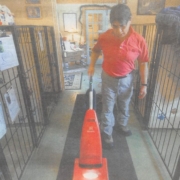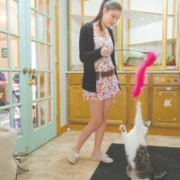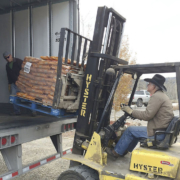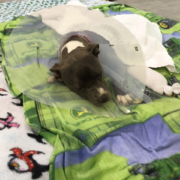FIV: A New Outlook
FIV: A New Outlook
Two of the Animal Adoption Center’s adoption counselors, Amanda and Jenna, recently traveled to New Orleans to attend the Humane Society of the United States annual Animal Care Expo. They attended many seminars that expanded their knowledge on current animal care protocol. One such seminar regarding the intake and adoption of FIV positive cats made a huge impact.
What is FIV?
Feline Immunodeficiency Virus is found in cats worldwide. This virus weakens a cat’s immune system by reducing the number of white bloods cells, leaving them more susceptible to various secondary infections. It is transmitted from cat to cat via deep bite wounds. Most often, FIV is prevalent in feral colonies in which un-neutered males must fight each other for food and other resources. FIV has until very recently been fairly misunderstood.
Testing for FIV:
Common protocol in shelters around the United States has always been to use a blood test to determine if a cat was FIV positive. At the Animal Adoption Center, we have tested each and every cat that comes to the center. We would then have the cat live in quarters that were isolated from other cats and would adopt them out to homes were they would be a single cat. Certain shelters even have the policy to immediately euthanize cats that test positive.
What’s the big deal?
Obviously a virus that weakens the immune system sounds rather scary. However, in recent years more and more studies have been conducted to better understand the long-term effects of the disease and also how it spreads. One such study looked at the lifespan of FIV+ cats. Because it is such a slow acting virus, most FIV cats can enjoy a normal lifespan with no apparent health problems. Another study housed 138 cats, 6 of which were FIV +, together for over 2 years and then re-tested all cats for FIV. There was zero transmission in the cat colony. It has become increasingly obvious that FIV is not as “serious” of a threat as previously thought.
Changing the Protocol:
Now that it is understood that the transmission rate of FIV is nearly zero in a spayed/neutered cat colony and that FIV+ cats have a similar lifespan to FIV- cats, shelters all over the US are changing their protocol. Many shelter veterinarians suggest communal housing for friendly FIV cats! Obviously if a cat is very aggressive to other cats, they should be housed separately regardless if they are FIV+ or not. Many vets are also suggesting doing away with testing for FIV altogether. Shelters and rescues across the country are accepting this change. Typically, FIV+ cats have spent a considerable amount of time in the shelter system before they are adopted. Educating potential adopters about this disease has helped find FIV cats homes much quicker.
The Animal Adoption Center always strives to do what is best for our animals. We are excited to adapt to new information and have re-vamped the way we approach FIV+ cats. While we don’t often see FIV cats come through the center, those who do typically have a much longer stay here before finding their new home. We are excited that moving forward we will be able to let these cats live communally and go to homes with other cats!







